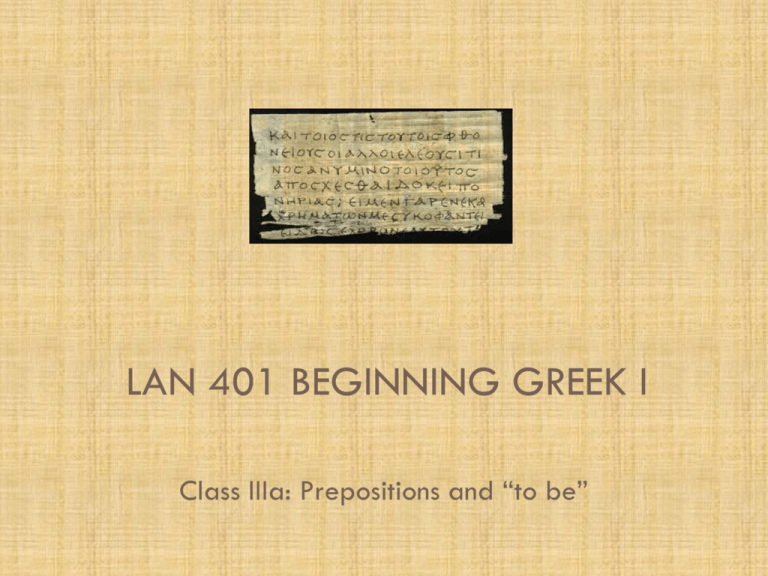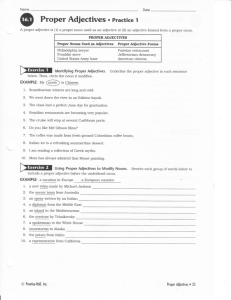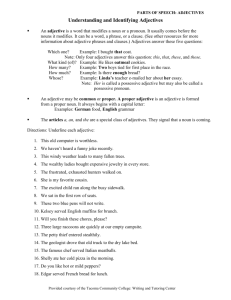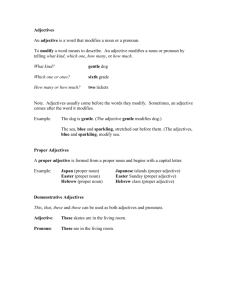LAN 401 Beginning Greek I
advertisement

LAN 401 BEGINNING GREEK I Class IIIa: Prepositions and “to be” Prepositions and “to be” 1.1 Prepositions in English Prepositions: Indicates the relationship of two words in a sentence Indicate direction of action Indicate location of action Ex. In English The book is on the table. The book is beneath the table. The book is under him (NOTE: objective) Prepositions and “to be” How do you say in English? “The professor is him” OR “The “to professor is he” be” tells something about the subject (not direct object) Predicate nominative Prepositions and “to be” 1.2 Prepositions in Greek A Greek preposition can be used with one, two, or three different case endings The meaning of a prep. depends on the case of its object! διὰ + gen. through διὰ + acc. because of Prepositions and “to be” Translation: ὁ λόγος ἔρχεται εἰς τὸν κόσμον The word goes into the world ὁ λόγος / ἔρχεται / εἰς τὸν κόσμον ὁ λόγος ἔρχεται εἰς κόσμον The Greek sentence often does not have the article. Prepositions and “to be” Preposition that is attached to a verb = compound verb βλέπω + διά διαβλέπω Meaning of the verb changes (usually intensifies) βλέπω - I see διαβλέπω – I see through Cf. English – House burns; house burns up Prepositions and “to be” Prepositions and “to be” Prepositions and “to be” Elision: A preposition drops the final vowel before a word beginning with vowel μετὰ αὐτον μετ΄ αὐτόν μετὰ ἡμῶν μεθ΄ ἡμῶν -- with him -- with us No need to memorize – just be aware! Prepositions and “to be” 2.1 Greek Verb Basics Greek verb: stem + personal ending λυ- (Pres. Stem) + -ω (personal ending) λύω (pres. act. indic. sg. 1) Prepositions and “to be” Basic Greek Verb paradigm (Present indicative) Singular Plural λύω λύεις I loose λύομεν You loose λύετε λύει He/she/it λύουσιν They loose looses We loose You loose Prepositions and “to be” εἰμί Sg. 1 Sg. 2 Sg. 3 Pl. 1 Pl. 2 Pl. 3 “To be” εἰμί εἶ ἐστίν ἐσμέν ἐστέ εἰσίν I am You are He/she/it is We are You are They are This chart needs to be memorized!! (p. 59) Prepositions and “to be” In-class practice Workbook p. 19 LAN 401 BEGINNING GREEK I Class IIIb: adjectives Adjectives 1. Adjective in English Adjective is a word that modifies a noun (or another adjective) A good book 1.1 Use of adjectives in English: Adjectivally (attribute and predicate) Substantivally Adjectives 1.1.1 Adjectivally: Attributive adjective He is a good student Predicate adjective (adjective after the verb) The student is good Notice the position of the verb in relation to the adjective Adjectives 1.1.2 Substantively (as if the adjective were a noun) The good need not bother but the evil are welcome . Out with the old and in with the new. 1.1.3 Phrases that function adjectivally The man on the street is walking away (prepositional phrase) Sitting on the dock is great relaxation (phrase) Adjectives 2.1 Adjectives in Greek 2.1.1 Basic concepts: Adjectives are used to modify nouns (like in English) Greek adjectives have (like nouns): Gender (masc., fem., neut.) Number (Sg./Pl.) Case (Nom., Gen., Dat., Acc.) Adjectives Adjective must agree with the noun it modifies in: Gender Number Case ἡ ἀγαθὴ ἐκκλησία (The good church) ἀγαθός- ή –όν (good) ἡ ἐκκλησία -ας (church) The noun and the adjective are feminine, singular, nominative Adjectives ὁ ἀγαθὸς ἀδελφός The good brother ὁ ἀδελφός and ἀγαθὸς are both masc. , sg., nom. βλέπω τὸν πιστὸν ἀδελφόν I see the faithful brother πιστός and ὁ ἀδελφός must be in accusative case Singular Masc. Fem. Neut. Nom. ἀγαθός ἀγαθή ἀγαθόν Gen. ἀγαθοῦ ἀγαθῆς ἀγαθοῦ Dat. ἀγαθῷ ἀγαθῇ ἀγαθῷ Ac. ἀγαθόν ἀγαθήν ἀγαθόν [Voc. ἀγαθέ ἀγαθή ἀγαθόν] Plural Masc. Fem. Neut. Nom. ἀγαθοί ἀγαθαί ἀγαθά Gen. ἀγαθῶν ἀγαθῶν ἀγαθῶν Dat. ἀγαθοῖς ἀγαθαῖς ἀγαθοῖς Ac. ἀγαθούς ἀγαθάς ἀγαθά Voc. -- -- -- Singular Masc. Fem. Neut. Nom. δίκαιος δικαία δίκαιον Gen. δικαιοῦ δικαίας δικαιοῦ Dat. δικαιῶ δικαίᾳ δίκαιῳ Acc. δίκαιον δικαίαν δίκαιον [Voc. δίκαιε δικαία δίκαιον] Plural Masc. Fem. Neut. Nom. δίκαιοι δίκαιαι δίκαια Gen. δικαίων δικαίων δικαίων Dat. δικαίοις δικαίαις δικαίοις Acc. δίκαιους δικαίας δίκαια Voc. -- -- -- Adjectives 2.2 The use of the adjectives 2.2.1 Attributive use (i.e. ‘a good boy’) The adjective attributes a quality to the noun Two possible positions of the adjective ὁ ἀγαθὸς λόγος OR ὁ λόγος ὁ ἀγαθός “The good word” in both cases The first example places more emphasis on the adjective When the article precedes the adjective, translate attributively Adjectives 2.2.2 Predicative use (i.e. ‘The boy is good’) The adjective makes an assertion about the noun Two possible positions of the adjective ὁ λόγος ἀγαθός OR ἀγαθὸς ὁ λόγος “The word (is) good” in both cases The verb “is” is implied in the construction Noun + predicate adjective complete sentence Article does not immediately precede the adjective Adjectives 2.2.3 Substantive use (i.e. ‘The good’) The adjective functions as a noun Some examples ὁ ἀγαθός ἡ ἀγαθή “The good man” οἱ ἀγαθοί οἱ νεκροί “The good woman” “The good people” “dead people” The article can also be used substantively ὁ ταῖς τά “the man” “to the women” “the things” Adjectives 2.2.4 Absence of the article No article before noun or the adjective Attribute or predicate? ἀγαθὸς ἄνθρωπος - “A good man” or “A man is good” ἄνθρωπος ἀγαθός - “A good man” or “A man is good” Context becomes the guide to translation Adjectives 2.2.5 Summary of Adjectives Adjective Gk. construction Translations Attributive position ὁ ἀγαθὸς λόγος The good word Predicate position OR ὁ λόγος ὁ ἀγαθὸς ὁ λόγος ἀγαθός The word (is) good OR Substantive position ἀγαθὸς ὁ λόγος ἡ ἀγαθή OR ὁ ἀγαθός The good (woman) The good (man) Adjectives Does it make any difference? 13 καὶ μὴ εἰσενέγκῃς ἡμᾶς εἰς πειρασμόν, ἀλλὰ ῥῦσαι ἡμᾶς ἀπὸ τοῦ πονηροῦ. “…deliver us from evil.” Matt 6:13 KJV “…deliver us from the evil one.” Matt 6:13 NIV What is the difference? Any theological implications? Adjectives 13 καὶ μὴ εἰσενέγκῃς ἡμᾶς εἰς πειρασμόν, ἀλλὰ ῥῦσαι ἡμᾶς ἀπὸ τοῦ πονηροῦ. “…deliver us from evil.” Matt 6:13 KJV “…deliver us from the evil one.” Matt 6:13 NIV Adjective – attributive, predicate or substantive? Article τοῦ indicates that it is substantive God protects form the Devil - not from all evil and harm Adjectives In-class practice p. 23 Homework p. 21, no: 7, 10 p. 25, no: 7-10 Exam I in two weeks!








